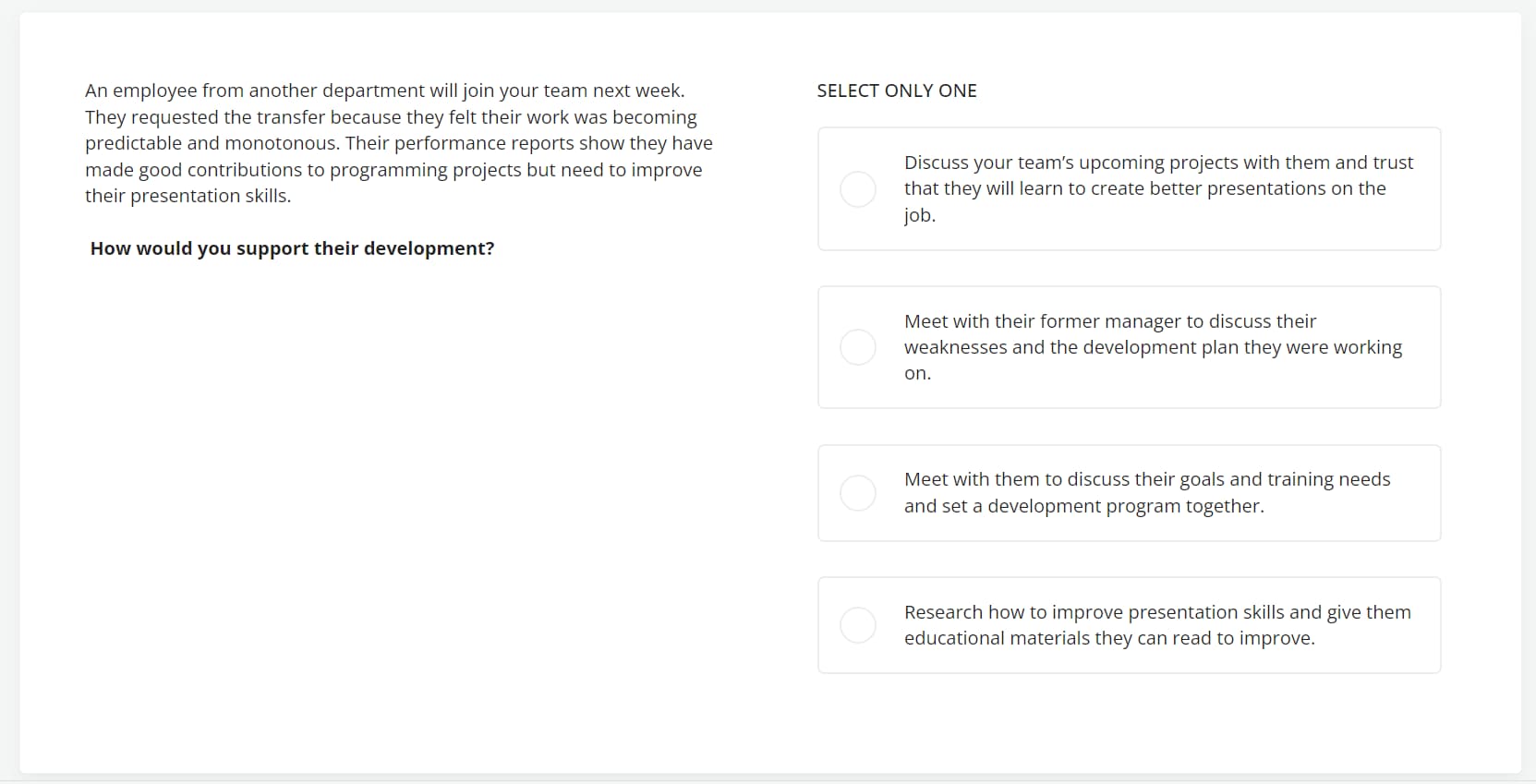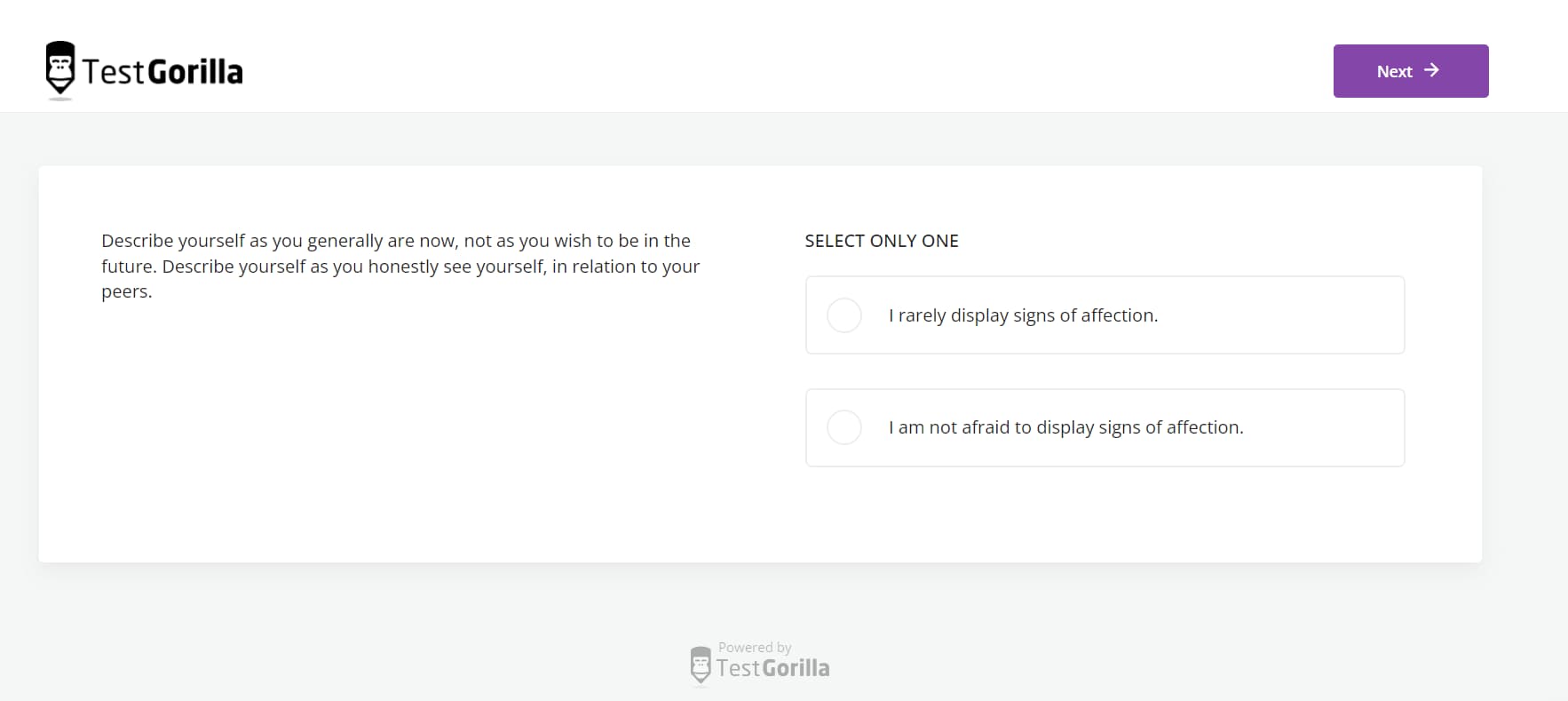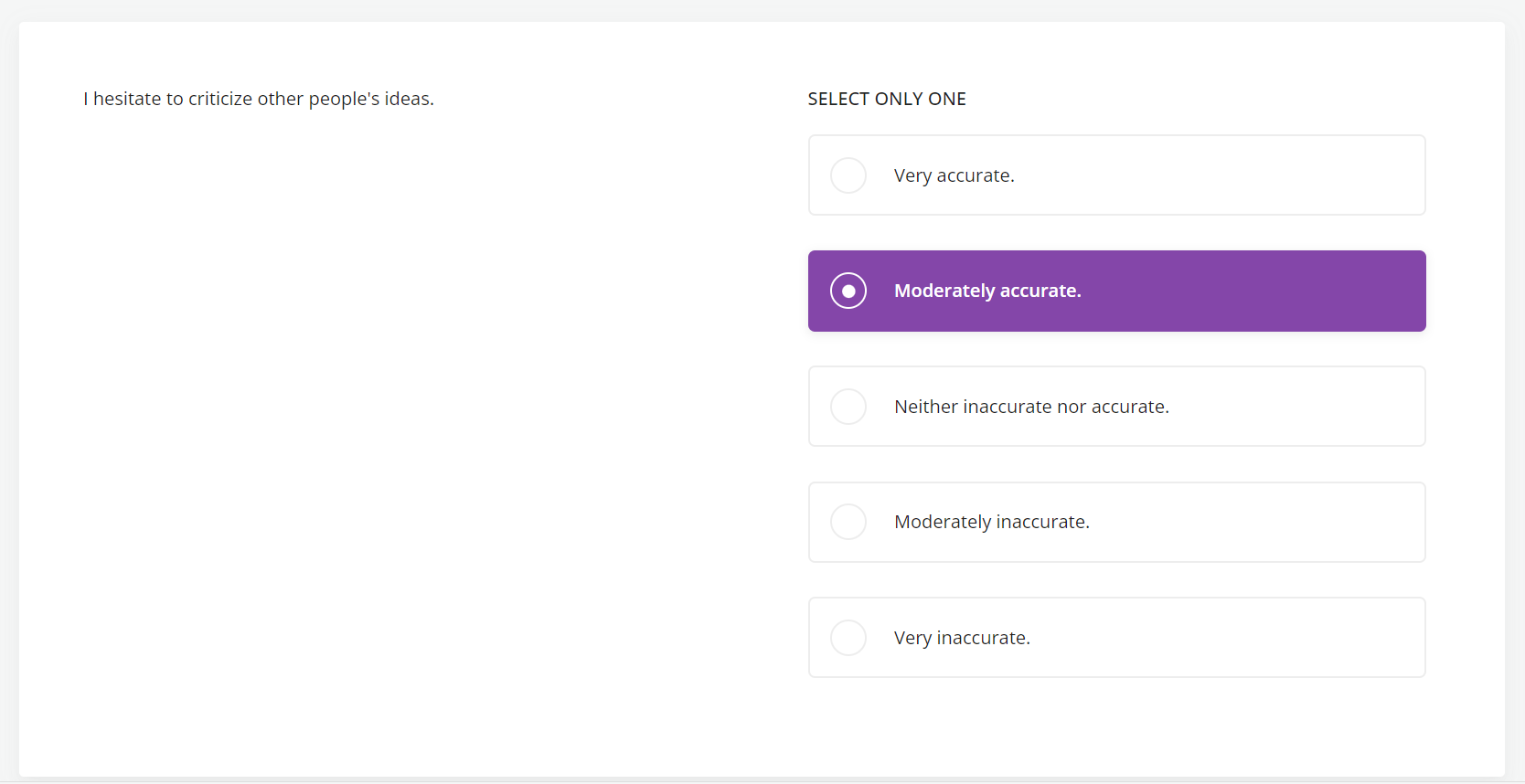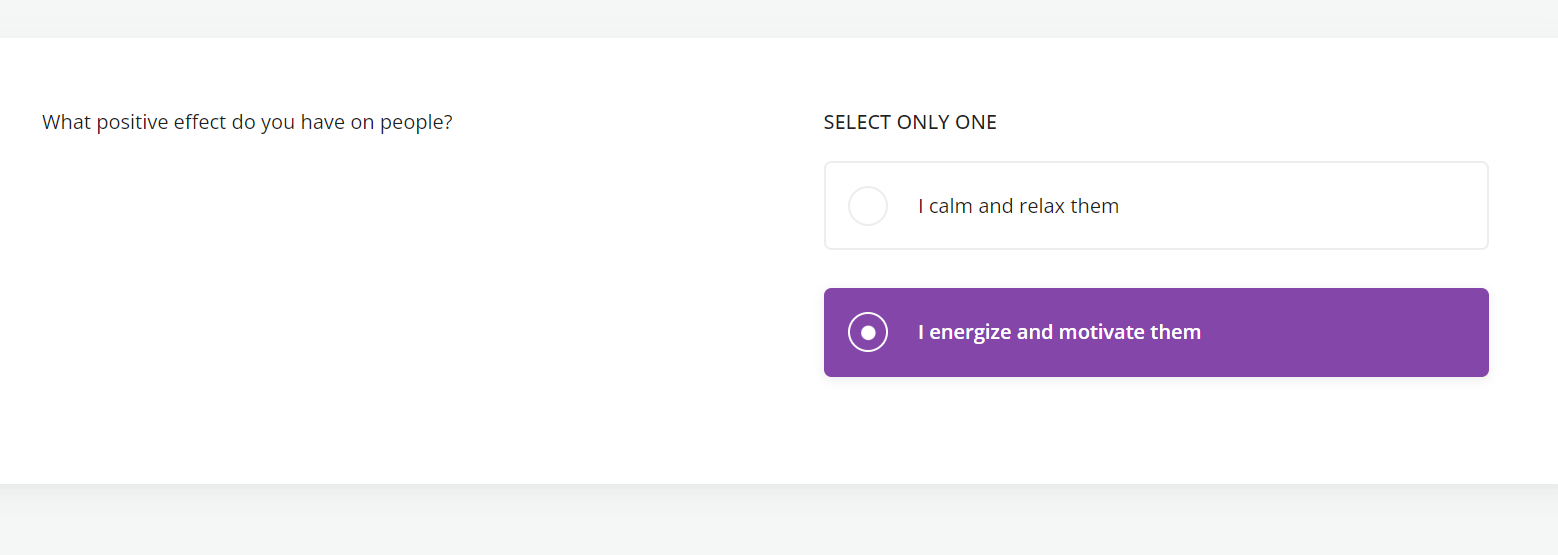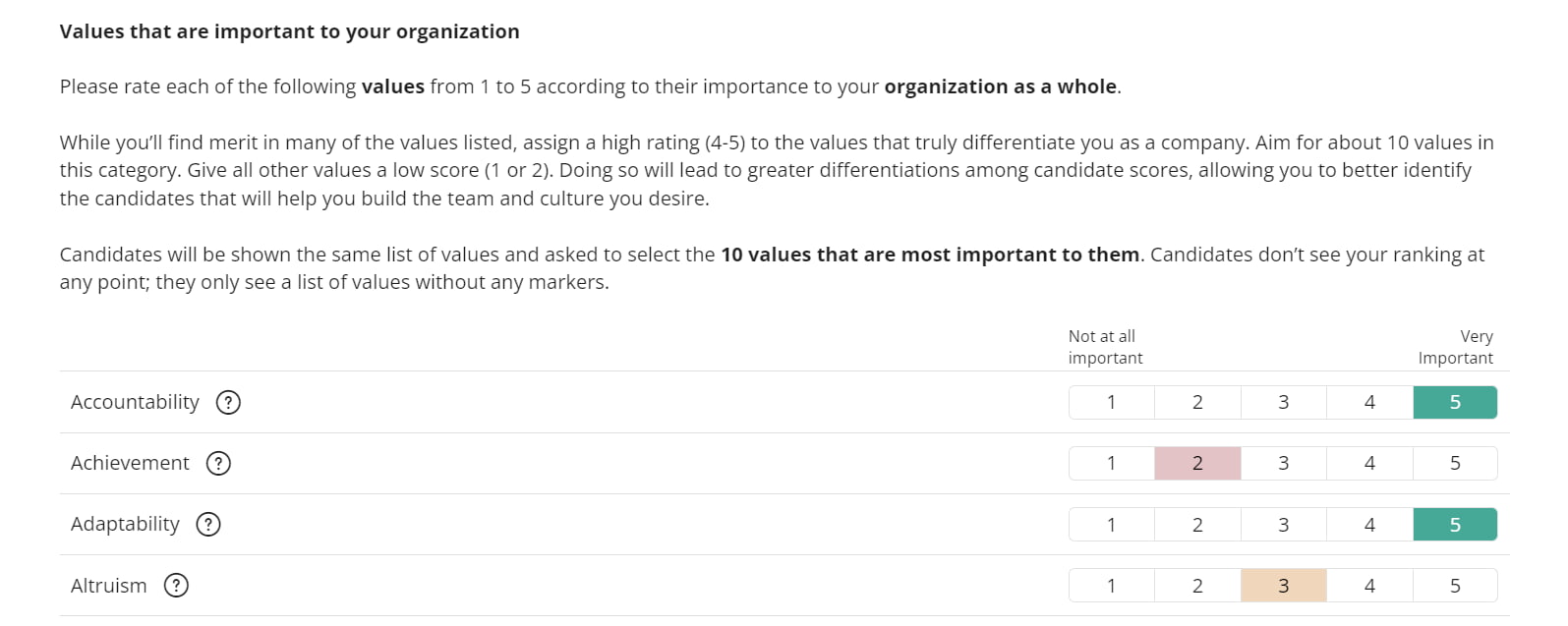11 people management skills and how to assess them when hiring strong leaders
Business is about people, whether they be clients, co-workers, or subordinates. However, managing the latter can be especially difficult without the necessary people management skills, such as communication, self-awareness, and supportiveness.
This is why you must know how to hire an excellent leader who can manage conflict and the team’s strengths and weaknesses. Talent assessments help you do this.
In this article, we examine what people manager skills are necessary for success, why you need them, and how to assess these skills in new candidates.
Table of contents
11 fundamental people management skills and traits
Effective people leadership skills are essential for solid direction, employee retention, professional development, wellbeing, and work-life balance.
However, only 35% of HR leaders and 40% of employees agree that leaders in their company have the skills they need to succeed in day-to-day situations and initiatives.
Managing people skills differs from company to company, depending on your work environment and ideal leadership style; however, we can make a universal list of 11 pivotal people management skills, including conflict resolution, adaptability, and decisiveness.
1. Emotional intelligence
Emotional intelligence is understanding emotions to relieve stress, resolve conflict, and encourage employees, and it’s one of the most critical people management skills. It’s a soft skill, and companies often leave it out of the big picture of the hiring process.
Emotional intelligence is key to solid leadership. It’s the driving force behind many other people manager skills and helps leaders reach their full potential.
Emotional intelligence enables people to understand others, helping them know the “why” and “how” behind employee reactions and motivations.
A great manager understands the primary motivations of their team members and addresses them after onboarding in one-on-one meetings and on other occasions to encourage career development without losing sight of the bigger picture.
2. Effective communication
A good leader must get their message across and frame it so employees understand. However, 69% of managers feel uncomfortable communicating with their employees.
Verbal and non-verbal communication includes:
Spoken word
Written communication
Body language
Facial expressions
If a manager tries to be encouraging, but their words don’t match their facial expressions or body language, the employees don’t trust what they hear.
Effective communication is necessary for smooth business operations. Managers must be clear about tasks, deadlines, and client needs without overwhelming employees.
3. Active listening
Managers need to excel in active listening to address concerns and build trust.
Active listening is the ability to be present and engaged when hearing information. It’s listening to, understanding, retaining, and reflecting on the information. An example includes concentrating on what an employee is saying instead of thinking about what you’re going to say next.
People managers who actively listen to their employees are better equipped to manage interpersonal relationships, mitigate workplace conflicts, and prevent arguments.
4. Self-awareness
Self-awareness helps managers reflect on their actions and monitor their growth. They’re aware of their issues and reflect on upward feedback from employees.
Managing people skills like self-awareness helps managers stay accountable, which creates a stronger team and builds workplace trust. For example, a manager who recognizes that they miscommunicated a client requirement to their team and acknowledges it gains the respect and trust of their people.
Self-awareness is also a marker of confidence. These managers don’t punish employees for their criticism, inspiring other employees to better themselves and objectively examine how they work and manage workplace relationships.
5. Stress management
Stress and leadership positions go hand in hand. Managers must handle their stress and work calmly under pressure, whether they address a conflict between employees or a difficult client.
Managers are getting more responsibilities, which increases the odds of anxiety by 21% and burnout by 520% and hurts the odds of engagement by 51%. Subordinates lose confidence in their work and the company if they can’t rely on their manager for guidance in difficult situations.
Many other managing people skills also benefit from stress tolerance. Managers are more decisive and supportive, have healthy stress management skills, and are more efficient at resolving conflict.
6. Conflict resolution
Workplace conflict is a natural part of every organization; how you handle it matters.
One of the strongest people management skills for managers is conflict resolution. Listening to every party involved and finding a peaceful solution are musts when problem-solving.
The ability to resolve conflict also means knowing how to negotiate. As a mediator, the manager must stay impartial and intervene where necessary. Their goal should be to resolve the issue, avoid resentment, and get everyone back to doing the best work.
7. Adaptability
Adaptability is essential for negotiations, decision-making, and conflict resolution. If managers can’t adapt to situations or new information, work can overwhelm them and trap them in a thought loop or behavior pattern.
Great adaptability helps your company flourish. For example, a client changes their requirements for a project, and your manager quickly adapts the scope and informs their people. This flexibility is particularly important when hiring project managers.
Adaptability and flexibility are also signs of sound judgment. If managers adapt to new information, they make good decisions even when deadlines are involved.
8. Decisiveness
A manager who can take swift action inspires confidence. They must make decisions quickly and maintain the company’s interests when dealing with problems with employees or clients.
Confident decision-making is one of the core people manager skills and a hallmark of strong leadership. Employees need to know they trust someone who is solid and sure of themselves.
Managers shouldn’t be harsh or take unnecessary risks. Confident decision-makers handle difficult situations calmly, thinking critically without being slow or insecure.
9. Support
Being supportive brings out the best in employees. A supportive manager can encourage and motivate employees, play to their strengths, supplement their weaknesses, and make them feel seen.
According to employees, supportiveness is one of the top five qualities that many managers lack, alongside a positive attitude and interpersonal skills.
An environment that feels safe and supportive makes employees happier, keeps them engaged, and encourages them to improve their skills. This environment also makes them comfortable enough to listen to constructive criticism and work to improve their skills.
10. Balance
Managers have many responsibilities on their plate, so balance is essential. Creating a space between work, friendship, and leadership is important for every workplace.
For example, an HR manager must balance relationships with current and potential employees, correspondence with senior leadership, team-building events, and conflict.
For more information on this subject, check out our piece on how to hire an HR manager.
A dynamic, balanced manager keeps employees motivated and gracefully handles both good and bad situations.
11. Culture skills
An important people management skill for managers is the ability to uphold, grow, and maintain company culture.
A manager who fosters culture knows how to engage employees. They can sell company culture effectively, getting employees to participate in events and invest in the company’s growth. They also help attract and retain top talent.
However, managers must align with your culture to properly connect and promote it. Cultural skills are essential traits to gauge in every manager you evaluate.
How to assess people manager skills and traits: 7 tests
Assessing people manager skills in your candidates is crucial because only one in five managers possess a high level of talent for managing others.
The best way to do this is through a mixture of talent assessments. Resumes don’t give you an accurate picture of a person’s capabilities, but assessments objectively gauge skills. A people management skills assessment should contain technical, soft skills, and personality tests.
Our hiring team at TestGorilla hires top engineers this way. Leveraging multi-measure testing, we can assess the whole candidate, including cognitive and role-relevant abilities.
Keep in mind that personality tests, while important, shouldn’t be used on their own to make hiring decisions. They give you a deeper understanding of your candidates and their management potential.
Interested in learning how to assemble tests into a complete assessment? Read more in our product tour.
1. Leadership & People Management test
This test evaluates leaders and people managers in real-life business situations, helping you determine strong people manager skills, such as decisiveness and supportiveness.
The Leadership & People Management test hails from the work of the Hersey-Blanchard Situational Leadership model. This model argues that there is no one management style. Instead, leadership should be dynamic.
Based on the results, you can discover how the candidate:
Manages task delegation
Deals with feedback
Handles responsibility
Develops direct reports
Because this management assessment test evaluates candidates based on real-life situations, it’s the best indicator of how they manage real issues, avoid micromanaging, and handle tasks independently.
Enneagram Personality test
The Enneagram Personality test assesses a candidate’s emotional intelligence, conflict resolution, and balance.
It’s a personality test based on the work of Oscar Ichazo and Claudio Naranjo, who developed a model for determining people’s core beliefs.
It identifies these beliefs and shows how they manifest in their personality.
If you already know the type of manager your team needs, the Enneagram Personality test is an effective way to hone in on the best candidates.
DISC Personality test
The DISC Personality test is a behavior model with decades of research behind it. This test evaluates candidates’ adaptability, conscientiousness, and steadiness.
Psychologist William Marston developed the DISC model to see how people express their emotions, focusing on how people handle high-stress or emotionally charged situations.
This test is a great way to see how managers handle their subordinates when things get tough.
The DISC model divided participants based on these four traits:
DISC trait | Description |
Dominance | Bold and hungry for a challenge |
Influence | Optimistic and encouraging |
Steadiness | Calm and patient |
Conscientiousness | Detail-oriented and stable |
If you’re interested in more sample questions, check out the DISC Personality test preview.
People aren’t one-dimensional and usually have two of these four traits. By examining how these traits play out, you can see how the candidate treats the people around them and manage emotional situations.
Communication test
The Communication test evaluates a candidate’s written and verbal communication skills, both in-person and virtually. It also helps you determine active listening skills that can help the employee experience, teamwork, and performance management.
This test also assesses the ability to:
Understand and summarize information
Clarify next steps
Use professional etiquette
Sarah E., a storyteller, communication coach, and author working in public sector agencies, crafted our Communication test.
Good communication is essential for a people management skills assessment, although it’s difficult to gauge with traditional methods. Luckily, skills-based hiring methods like talent assessments and structured interviews are reliable for measuring communication skills.
16 Personalities test
The 16 Personalities test establishes how candidates absorb information and make decisions.
Based on Carl Jung’s discoveries on human judgment and perception, the 16 Personalities test examines our worldview and how it influences our decisions.
It significantly impacts how people managers perceive those working with them and how they handle everyday issues like stress, criticism, and conflict.
The 16 personalities test analyzes personalities on a spectrum:
Introversion (I) versus extroversion (E)
Intuition (N) versus sensing (S)
Feeling (F) versus thinking (T)
Judging (J) versus perceiving (P)
The test does an in-depth overview of the personality types, including a career and relationships analysis. With this, you can narrow down the candidates that best suit your company’s idea of a people manager.
Big 5 (OCEAN) test
The Big 5 (OCEAN) test evaluates five overarching dimensions of personality:
Openness
Conscientiousness
Extroversion
Agreeableness
Emotional stability
This test uses the five-factor model (FFM), a theory that suggests five broad traits form the basis of personalities. Each trait is examined on a wide spectrum, giving you an understanding of a candidate’s leadership style.
The Big 5 (OCEAN) test is also great for assessing your team’s dynamics and culture, helping you determine which future candidates would be the most successful.
Interested in giving this test a try? The Big 5 (OCEAN) test is available in our Free Forever Plan.
Culture Add test
“Culture fit” is the traditional way to assess culture, and it’s too problematic for our liking. Too often, culture fit is an excuse to hire candidates that are the same as current staff, which is a form of biased hiring that leads to sexism, ageism, and racism.
Talent assessments enable recruiters to assess culture with the Culture Add test objectively.
The Culture Add test evaluates how a candidate’s behaviors and values align with your company’s based on a personalized survey you fill out.
This test measures candidate results against your survey responses, ranking candidates based on how they align with your culture.
The Culture Add test helps you find candidates who share your motivations and drive without relying on outdated culture fit methods.
Hire the best people managers with TestGorilla
Are you ready to hire the best people managers with TestGorilla’s talent assessments?
The best insights on HR and recruitment, delivered to your inbox.
Biweekly updates. No spam. Unsubscribe any time.
Summary: The 11 key people management skills and how to test for them
People manager skills | How to assess them |
1. Emotional intelligence | Determine a candidate’s empathy and how they understand others |
2. Effective communication | Gauge a variety of communication skills, including written, verbal, and non-verbal |
3. Active listening | Examine how a candidate understands, retains, and reflects on information |
4. Self-awareness | Evaluate a manager’s accountability and openness to constructive feedback |
5. Stress management | Assess people’s confidence and how they react to sudden change |
6. Conflict resolution skills | Discover how candidates mediate disputes and negotiate |
7. Adaptability | Test if candidates can quickly and effectively react to new challenges |
8. Decisiveness | Consider a manager’s confidence and capacity to make sound decisions |
9. Supportiveness | Define a manager’s conscientiousness, empathy, and ability to encourage others |
10. Balance | See how candidates handle multiple responsibilities, such as maintaining relationships and resolving conflict |
11. Culture skills | Gauge people’s motivations and values and how they align with your company’s |
How to develop people management skills
Managing people skills is valuable for hundreds of leadership roles, so how do you develop them?
Great people managers need to practice communicating with people, focus on building empathy, and strive to create stronger relationships. It’s also important to practice confident decision-making. Many professionals may second-guess themselves, but leaders must strike the perfect balance between confidence and humility.
After actively practicing good people management skills, like adaptability, it’s important to assess and refine your progress through regular check-ins and feedback from employees and superiors.
We suggest you pick out two coaches to guide you on your journey – a reverse mentor from your employees and a more experienced guru from outside your organization.
Assess and hire the best people managers with TestGorilla
People management skills are an integral part of a successful business. However, wading through dozens of resumes isn’t the best way to see who’s right for the job.
Use this guide to determine the type of candidate your company needs, and then take advantage of TestGorilla’s talent assessments to find the candidate with the most effective people management skills.
Why not get started with a Free Forever account?
You can also learn how to assemble these tests into an assessment in our product tour or by booking a product demo with one of our friendly colleagues.
People management skills FAQs
Let’s finish with a few frequently asked questions about managing people skills.
What are people management skills?
Essential people management skills include communication, emotional intelligence, adaptability, and accountability. A good manager must support and inspire subordinates and have the strength to make difficult decisions.
We discussed these key skills in more depth earlier in this blog post.
Why are people manager skills important?
People managers need key skills to make their teams feel inspired, understood, and supported. Without these key skills, you risk damage to your company’s productivity, profitability, and employee engagement. People managers must know their team and how to manage them. They must resolve conflict amicably, encourage team cohesion, and inspire those around them.
What is a people manager skills assessment?
A people manager skills assessment is a series of tests that examine how a candidate leads and supports the people who work with or under them. People management assessments can range from personality tests to ethics questionnaires. These help you establish the candidate’s baseline personality and leadership style.
We discussed these assessments and how to use them earlier in this article.
What are some examples of good people management?
Good people management skills help leaders support employees and make difficult, sudden decisions. Good people managers must motivate people, resolve conflict, and handle new challenges. For example, managing people skills helps leaders gracefully help their staff transition through an organizational restructuring without affecting employee performance.
You can learn more about the most critical people management skills above.
How do you demonstrate people management?
Trust
Support
Authenticity
Hard work
Empowerment
Open communication
Team management
Always showing, not telling, is a key component of being an effective leader and empowering others – practice people management through actions, such as giving well-deserved feedback and staying accountable for your mistakes.
It shows a strong understanding of competencies like empathy, communication, and compassion – part of the skill set for connecting with people.
You've scrolled this far
Why not try TestGorilla for free, and see what happens when you put skills first.


